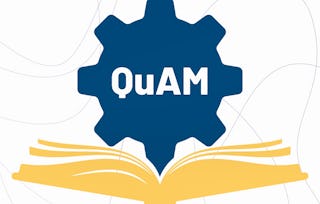This course provides a foundational understanding of machine learning models (logistic regression, multilayer perceptrons, convolutional neural networks, natural language processing, etc.) and demonstrates how they can solve complex problems in various industries, from medical diagnostics to image recognition to text prediction. Through hands-on practice exercises, you'll implement these data science models on datasets, gaining proficiency in machine learning algorithms with PyTorch, used by leading tech companies like Google and NVIDIA.

Introduction to Machine Learning

3,809 reviews
What you'll learn
Explain various machine learning models and how they can solve complex problems in multiple industries from medical diagnostics to text prediction.
Implement data science models on datasets through hands-on practice exercises.
Skills you'll gain
- Recurrent Neural Networks (RNNs)
- Reinforcement Learning
- Python Programming
- Convolutional Neural Networks
- Supervised Learning
- Natural Language Processing
- Artificial Neural Networks
- Machine Learning
- PyTorch (Machine Learning Library)
- Applied Machine Learning
- Image Analysis
- Deep Learning
- Medical Imaging
- Logistic Regression
- Computer Vision
- Unsupervised Learning
- Transfer Learning
- Skills section collapsed. Showing 7 of 17 skills.
Details to know

Add to your LinkedIn profile
24 assignments
See how employees at top companies are mastering in-demand skills

There are 6 modules in this course
The focus of this module is to introduce the concepts of machine learning with as little mathematics as possible. We will introduce basic concepts in machine learning, including logistic regression, a simple but widely employed machine learning (ML) method. Also covered is multilayered perceptron (MLP), a fundamental neural network. The concept of deep learning is discussed, and also related to simpler models.
What's included
23 videos3 readings10 assignments3 ungraded labs
In this module we will be discussing the mathematical basis of learning deep networks. We’ll first work through how we define the issue of learning deep networks as a minimization problem of a mathematical function. After defining our mathematical goal, we will introduce validation methods to estimate real-world performance of the learned deep networks. We will then discuss how gradient descent, a classical technique in optimization, can be used to achieve this mathematical goal. Finally, we will discuss both why and how stochastic gradient descent is used in practice to learn deep networks.
What's included
6 videos3 assignments2 ungraded labs
This week will cover model training, as well as transfer learning and fine-tuning. In addition to learning the fundamentals of a CNN and how it is applied, careful discussion is provided on the intuition of the CNN, with the goal of providing a conceptual understanding.
What's included
8 videos4 assignments2 ungraded labs
This week will cover the application of neural networks to natural language processing (NLP), from simple neural models to the more complex. The fundamental concept of word embeddings is discussed, as well as how such methods are employed within model learning and usage for several NLP applications. A wide range of neural NLP models are also discussed, including recurrent neural networks, and specifically long short-term memory (LSTM) models.
What's included
13 videos4 assignments2 ungraded labs
This week we'll cover an Introduction to the Transformer Network, a deep machine learning model designed to be more flexible and robust than Recurrent Neural Network (RNN). We'll start by reviewing several machine learning building blocks of a Transformer Network: the Inner products of word vectors, attention mechanisms, and sequence-to-sequence encoders and decoders. Then, we'll put all of these components together to explore the complete Transformer Network.
What's included
12 videos
This week will cover Reinforcement Learning, a fundamental concept in machine learning that is concerned with taking suitable actions to maximize rewards in a particular situation. After learning the initial steps of Reinforcement Learning, we'll move to Q Learning, as well as Deep Q Learning. We'll discuss the difference between the concepts of Exploration and Exploitation and why they are important.
What's included
10 videos1 reading3 assignments2 ungraded labs
Instructors



Offered by
Explore more from Machine Learning
 Status: Preview
Status: PreviewThe University of Chicago
 Status: Preview
Status: PreviewO.P. Jindal Global University
 Status: Free Trial
Status: Free TrialAlberta Machine Intelligence Institute
 Status: Free Trial
Status: Free Trial
Why people choose Coursera for their career

Felipe M.

Jennifer J.

Larry W.

Chaitanya A.
Learner reviews
- 5 stars
74.95%
- 4 stars
20.16%
- 3 stars
2.94%
- 2 stars
0.68%
- 1 star
1.26%
Showing 3 of 3809
Reviewed on Apr 27, 2021
Its really a helpful course to my career. I got to learn various things about machine learning from this course all thanks to Coursera. A valuable course for every machine learning aspirant.
Reviewed on Jun 26, 2021
Thanks to Coursera I now know the basic machine learning models as well as how I can implement them to solve real world problems. Excellent instructors and learning resources!
Reviewed on Nov 26, 2020
Thanks Coursera and Duke University for this course. It is very insightful to get understood the basics of ML and applied ML in numerous fields. It really made me to move ahead with ML domain.

Open new doors with Coursera Plus
Unlimited access to 10,000+ world-class courses, hands-on projects, and job-ready certificate programs - all included in your subscription
Advance your career with an online degree
Earn a degree from world-class universities - 100% online
Join over 3,400 global companies that choose Coursera for Business
Upskill your employees to excel in the digital economy
Frequently asked questions
To access the course materials, assignments and to earn a Certificate, you will need to purchase the Certificate experience when you enroll in a course. You can try a Free Trial instead, or apply for Financial Aid. The course may offer 'Full Course, No Certificate' instead. This option lets you see all course materials, submit required assessments, and get a final grade. This also means that you will not be able to purchase a Certificate experience.
When you purchase a Certificate you get access to all course materials, including graded assignments. Upon completing the course, your electronic Certificate will be added to your Accomplishments page - from there, you can print your Certificate or add it to your LinkedIn profile.
Yes. In select learning programs, you can apply for financial aid or a scholarship if you can’t afford the enrollment fee. If fin aid or scholarship is available for your learning program selection, you’ll find a link to apply on the description page.
More questions
Financial aid available,


